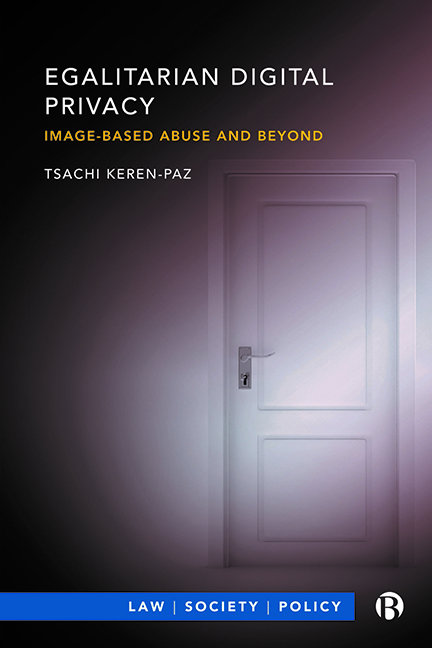Book contents
- Frontmatter
- Dedication
- Contents
- Acknowledgements
- Series Editor’s Preface
- 1 Introduction
- 2 Setting the Ground: The Intermediary Liability Debate and Framing Issues
- 3 First Principles and Occupiers’ Liability: The Case against Immunity
- 4 Property and Privacy: The Case for Strict Liability
- 5 Property and Privacy: Objections and Possible Extensions
- 6 The Policy Debate: Uniqueness of Harm from NCII
- 7 The Policy Debate: Freedom of Expression and Financial Costs of Filtering
- 8 The Easy Case for Viewers’ Liability: Child Pornography and Apportionment of Liability
- 9 Viewers’ Liability: Intention and Objective Fault
- 10 The Power of Property: Strict Liability for Viewing NCII
- 11 Scope of Liability for Breaches of Privacy
- 12 Is Suing Viewers Practicable?
- 13 Conclusion
- References
- Index
4 - Property and Privacy: The Case for Strict Liability
Published online by Cambridge University Press: 17 January 2024
- Frontmatter
- Dedication
- Contents
- Acknowledgements
- Series Editor’s Preface
- 1 Introduction
- 2 Setting the Ground: The Intermediary Liability Debate and Framing Issues
- 3 First Principles and Occupiers’ Liability: The Case against Immunity
- 4 Property and Privacy: The Case for Strict Liability
- 5 Property and Privacy: Objections and Possible Extensions
- 6 The Policy Debate: Uniqueness of Harm from NCII
- 7 The Policy Debate: Freedom of Expression and Financial Costs of Filtering
- 8 The Easy Case for Viewers’ Liability: Child Pornography and Apportionment of Liability
- 9 Viewers’ Liability: Intention and Objective Fault
- 10 The Power of Property: Strict Liability for Viewing NCII
- 11 Scope of Liability for Breaches of Privacy
- 12 Is Suing Viewers Practicable?
- 13 Conclusion
- References
- Index
Summary
Introduction
Chapter 3 established that S230 Communications Decency Act’s (CDA) complete immunity to hosts is incompatible with first principles determining the scope of intermediaries’ liability: control, fairness and a claimant’s right to an effective remedy. Similarly, complete immunity is incompatible with occupiers’ liability and liability of secondary publishers of defamatory statements. This chapter suggests that the analogy with sale of stolen goods is more appropriate than that of occupiers’ liability, so that intermediaries’ liability for NCII should be strict. It conceptualizes the right to privacy in intimate images as property, defends the applicability of the framework of conflicts over title to chattels to unauthorized dissemination of intimate images and draws the relevant conclusions: whether or not an innocent buyer has better title to the chattel than the original owner, the merchant is always strictly liable to the original owner. Internet intermediaries, as any other merchant selling ‘goods’ with defective title, ought to be strictly liable to the claimant. I defer the defending of the right to privacy in intimate images as property against several objections and examine possible extensions in Chapter 5. For current purposes, I just wish to clarify that this right should not be confused with copyright, and that it is therefore not limited to the takers of selfies. Rather, the right to control the private information – the claimant’s intimate image – should be treated as a property right which could be asserted against (even innocent) third parties, or at least (if deemed inalienable), be protected as if it were, and no less than, a property right. For ease of reading, I will refer to ‘intimate images as property’ as a shorthand for ‘the right to privacy in intimate images as property’. The focus of this, and the next chapter, is hosts’ liability; however, Chapter 10, Parts 3 and 4 extend the argument to viewers’ liability.
The analogy with conflicts over title will highlight three important points. First, that the case for intermediary liability in NCII cases could be mainly defended as derivative to the conclusion that the viewer does not have a legitimate interest in viewing NCII. Therefore, there is no justification for affording the intermediary an immunity, in order to protect viewers’ interests.
- Type
- Chapter
- Information
- Egalitarian Digital PrivacyImage-based Abuse and Beyond, pp. 54 - 71Publisher: Bristol University PressPrint publication year: 2023



